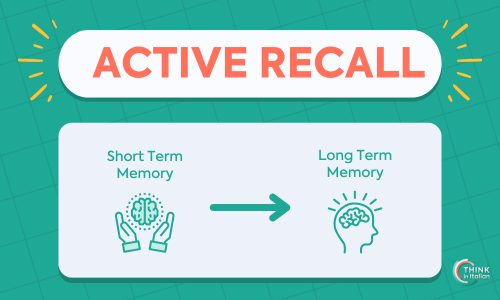What is active recall?
In the last years, there has been so much hype around active recall as it is believed to improve your study results and get you better grades.
Today, I’ll dig deeper into the topic and explain what is active recall and why it can dramatically improve your efficiency in language learning.
To keep it simple, active recall is a process that allows you to remember information easily. It involves bringing a piece of information from short-term to long-term memory.
The concept that lies behind this technique is straightforward.
Instead of reading, rereading, and highlighting a word or a sentence, it is much better to try to recall information without reading any notes.
How does this translate into practice?
Basically, you take a topic, create some questions based on it, and ask yourself those questions.
This process helps your brain to actively process and retrieve information.
The opposite happens when you read something: most of the time, you passively read some information and forget it after a short time interval (because you haven’t practiced nor recalled it).
Active recall is an effective way to test yourself and improve retrieval, and it has also been stated by research.
A study published in Science proved that students who used the active recall technique remembered about 80% of new word pairs in a foreign language (while those students who passively read a set of words were able to remember only 34% of the new pairs).
Another study ranked active recall as one of the most effective learning techniques compared to other methods, such as rereading or highlighting.
Active recall and passive review
Before practicing active recall, you must go through the process of reviewing a topic.
Without reviewing, you can’t bring to your mind the information you want to retrieve.
For example, if you want to ask yourself how you can greet someone in Italian, you first need to have a general view of Italian greetings.
What I mean is that before recalling something in your mind, you need to reread and review the information you want to remember.
What’s the difference between active recall and passive review?
Active recall is different from passive review because it consists in repeatedly asking yourself a question and stimulating your brain to retrieve the answer.
This helps you move the information from short-term to long-term memory, and that’s something you wouldn’t be able to do if you’d only review the information (for example, if you simply read it).
Many times, we skip the revision part because it takes more effort than just rereading a piece of information. But the truth is that passive review won’t lead you to remember the information.
Passive review is the preliminary step before active recall – if you want to answer a set of questions regarding a topic, you first need to read more about that topic to get a bit of context.
Active recall and spaced repetition technique
You can combine active recall with other language-learning techniques (like spaced repetition) to make your Italian study routine more efficient and rewarding.
Spaced repetition allows you to acquire information before you would forget and keep it constantly fresh in your mind.
The concept is simple: you learn a new word, and then you see it a few days later, then a few weeks later, etc. The more you study a new word, the easier you remember it.
In the end, it will stick into your long-term memory.
Spaced repetition technique is based on Ebbinghaus’s forgetting curve, which describes the rate at which you forget information once you learn it.
The German psychologist Hermann Ebbinghaus developed a formula based on that curve to determine the best time to review something.
Today, many apps (like Anki, Quizlet, and Memrise) use algorithms based on spaced repetition to optimize your study method.
For example, they present you with the information you need to retrieve at fixed time intervals, and then they show you less often until the information is absorbed into your long-term memory.
Using these apps alone is not enough; you can use spaced repetition technique as a “reinforcement tool” to optimize your language-learning process.
For example, you can rely on spaced repetition when you come across grammatical structures that seem useful.
But I don’t advise using it as a replacement for talking to people in Italian (or any other language you’d like to learn), writing, or reading an article or a story.
Learn more about spaced repetition technique in this detailed article.
How can you incorporate active recall into your study routine?
At this point, a question may arise: how can you use active recall in your study routine?
The ideal would be to write down a set of questions for every topic you study.
When you revise the topic (after you reread and review it), answer the questions without reading the notes.
If your answer isn’t correct, go back to your notes and try to answer correctly.
In this way, your brain is involved in the process of active retrieval, and it formulates questions based on what you have just read.
Something similar happens when you read something aloud or talk to yourself instead of simply reading silently.
Before diving deep into learning, be sure to choose the right resources for you.
Have you ever felt frustrated because what you’re reading (or listening to) is too hard to understand?
It is not your fault: you need to pick a different textbook, audio, or podcast. And that’s when comprehensible input comes to help.
The concept of comprehensible input has been introduced by the American linguist Stephen Krashen and is based on the idea that you can learn a new language only when the resources you are using (your input) are understandable (comprehensible).
This means that you need to pitch the proper resources – neither too hard nor too simple.
In the first case, you wouldn’t understand anything (and you risk feeling frustrated), while in the latter, the material would be extremely easy for you (and you might get bored).
So, be sure to pick the resources that allow you to understand just enough that you can follow along, even if there are some unknown words.
Learn more about comprehensible input.
Active recall in learning Italian
The active recall method can be an excellent solution if you struggle to learn Italian and memorize new words and phrases.

When you stimulate your brain to process and remember new information, you can improve your Italian proficiency and learn easily.
With all the courses out there, it is not easy to find the best one for you. I believe that a good Italian course should involve you actively and prompt you to speak.
In this sense, I believe that Ripeti con me is one of the best courses to learn Italian, and what makes it stand out is the fact that it uses active recall to help your learning process.
The course is based on audio lessons in which you hear a sentence and are asked to repeat it after a time interval.
The sentence you hear is the correct answer you need to recall – it works both as study material and practice material.
Ripeti con me does not consist in passively repeating a sentence after a teacher, but it rather constantly prompts you to speak. The pause after you hear the sentence is long enough to enable your brain to actively recall the sentence (instead of speaking along with the audio).
What’s more, the course is led by a native Italian speaker – which allows you to mimic his pronunciation and intonation.
With Ripeti con me, your brain is encouraged to process the information, and you will remember it easier than by just passively memorizing.
Additionally, Ripeti con me has a community forum where you can practice writing and conversational skills with other students. And ask questions about any grammar doubt you might have.
You can compare this process to removing the small extra wheel of a kid’s bicycle to enable him to keep balance by himself.
Active recall: does it work?
So, does active recall actually work in learning Italian?
The answer is simple: no “magic” technique allows you to learn Italian (or any foreign language) with no effort.
What active recall can do is make your learning process quicker and more effective. Its only flipside is that it takes way more effort than other techniques – because you need to stimulate your brain by thinking about possible questions and answering them.
But you can get several benefits if you pour enough perseverance (this means choosing the proper resources, finding a strong motivation, and dedicating at least 20 minutes a day to studying Italian).
To help the process, you can choose an Italian course that uses active recall (like Ripeti con me). A course surely helps you make the learning process smoother, but you need to be committed to learning.
Are you ready to speak like an Italian? Learn more about Ripeti con me.











One Response
Thanks for sharing this valuable tip! I’ve always struggled with passive repetition and I’m excited to try out active recall in my language learning journey.